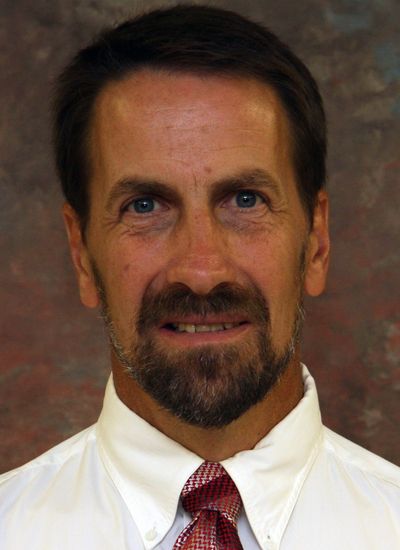Hump day coming up for Kerr

If a camel really is a horse designed by committee, that must make Stan Kerr responsible for getting him ready to run the Preakness.
Kerr, the men’s track coach at Eastern Washington, is a new member of the NCAA Division I executive committee. No Selection Sunday clout here as in basketball; mostly the track group is tossed the hot potato that is the NCAA regional meet concept and told to come back with curly fries seasoned to everyone’s tastes.
The four regionals this weekend – the West is in Eugene – are the last of their kind, and maybe the last period. The NCAA Championships/Sports Management Cabinet restructured the meets into two massive regionals for 2010, and a proposal by the Big 12 would eliminate even those, purportedly to cut costs.
“The bigger conferences fought tooth and nail not to have regionals in the first place,” Kerr said. “Their kids were already getting into nationals (via seasonal performance lists). Now we’re looking at slipping back to chasing marks again and the schools in position to fly their kids to bigger meets for better competition gaining the upper hand.
“Is that really good for track and field?”
Eliminating regionals will save money. Some major programs spend $30,000 or more to send large contingents, and the meets extend the season two weeks – adding expenses for schools on the semester system to house and feed athletes.
But regionals were instituted in 2003 to make national qualifying head-to-head competition and eliminate the travel to pursue qualifying opportunities. And under the two-regional format, the “West” meet could be two time zones away – leaving a West Coast school to pick up the tab for a trip to, say, Austin instead of Eugene.
It will also be a logistical nightmare – the horse by committee – which Kerr’s group must address.
“It’ll be 1,800 kids at a three-day meet,” he said. “You’ll have four flights of 12 in the hammer throw and the last guy will wait around two hours. How is this going to be a good experience for athletes?”
Chances are it won’t be – more ammo to those who want to kill it completely.
King for a day
It had been a frustrating season for Washington State intermediate hurdler Lorraine King – at least until she won her first Pacific-10 championship. Up to then, King hadn’t broken a minute in the event all year and “didn’t have much confidence in my running,” she said.
But instead of the hurdles, she ran the 200 and 400 meters in the dual against Washington two weeks before the Pac-10s and zipped times of 23.82 and 54.27 seconds – well below her bests.
“That showed me I could run fast, regardless of how I’d been running the hurdles,” she said. “It was just a matter of putting it all together and one day in practice before Pac-10s, I finally did.”
Her 57.51 clocking gave WSU two Pac-10 champs in the event with defending NCAA titlist Jeshua Anderson – a training partner King finds both inspiring and daunting.
“He can just go out and make it look like nothing,” she said, “and I’m worrying about just getting to the first hurdle. I admire his strength and determination and work ethic, and it helps me being around someone who loves to run – but what he does, I can’t do.”
‘Air Canada’ wristbands
A shock wave went through the Cougars on the eve of Pac-10s when they learned teammate Shawn Swartz had been diagnosed with acute lymphoblastic leukemia. A regional qualifier and a 7-foot high jumper from Port Coquitlam, British Columbia – hence the nickname “Air Canada” – Swartz has returned home to begin chemotherapy.
To help defray medical expenses, the team is selling $5 wristbands with the inscription “Pride gives us the inner strength to persevere” and Swartz’s initials, available through assistant coach Matt McGee at mdmcgee@wsu.edu.
This isn’t the first such endeavor by the Cougs. In 2006, the team supported hurdler Eric Nygard after his diagnosis for testicular cancer. Nygard is now completing postgraduate studies and serving as a volunteer coach at EWU.
Bell lap
A number of other regional qualifiers won’t be making the trip to Eugene, mostly because of injuries. They include WSU’s Anna Layman (shin splints) in the 800 and Lynnea Braun (shoulder) in the javelin, and EWU’s Bonnie Berscheid (shoulder) in the discus. Idaho’s Elvie Williams tore an ACL competing at the WAC championships and is out of the long and triple jumps. And Portland’s Justin Houck (Ferris) never recovered from the ankle injury he suffered running his qualifying time at the Mt. SAC Relays. WSU intermediate hurdler J Hopkins will not run in what the school explained only as a “coach’s decision.” … Western Washington freshman Ellie Siler (Lewis and Clark) had quite a meet at the NCAA Division II championships. Seeded 16th in the 400, Siler slashed nearly 11/2 seconds off her lifetime best to run 54.59 and finish fifth, earning All-American honors. … Whitworth sophomore Elizabeth Mattila took fifth in the 400 hurdles at the Division III nationals, but don’t expect her to improve in 2010. She’s planning to study in Spain and will miss the track season, though she will play soccer in the fall for the Pirates. “Bad decision,” teased track coach Toby Schwarz. “She should go first semester. At least that’s what I told the soccer coaches.”